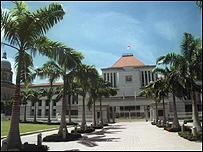
Elections take place every 5 years
|
Singapore's voters go to the polls on 6 May to elect a new single-chamber parliament.Although there are 84 seats to be allocated, 37 of them have already been won uncontested by the governing People's Action Party (PAP).
The new parliament will be returned for a maximum of five years.
Who is eligible to vote?
There are 2.15m registered voters in Singapore. Anyone who has reached the age of 21 may register to vote, and voting is compulsory.
With Singapore's opposition parties fielding candidates in 47 of the 84 constituencies, only 1.2m voters will actually be called upon to make their choice on election day.
Polling stations will be open from 0800-2000 local time (0000-1200 GMT).
Who is standing?
The PAP is seeking its 12th consecutive term in office since 1959. In the last poll in 2001, the PAP won 75% of the vote, gaining 82 of the 84 seats.
The governing Prime Minister Lee Hsien Loong, 54, is the son of former premier Lee Kuan Yew. He was appointed as predecessor to Goh Chok Tong in August 2004.
There are three main opposition groupings: The Workers' Party is contesting 20 seats; the Singapore Democratic Alliance - a coalition of four parties - is also contesting 20 seats; the Singapore Democratic Party is contesting seven seats.
Opposition parties have never held more than four seats in any of Singapore's parliaments. They also face negative coverage on the state-owned broadcasting networks and in the pro-government newspapers.
What are the issues?
Foremost amongst these are the economy and public services.
The PAP is credited with turning Singapore into a wealthy, dynamic financial and manufacturing centre.
As in many countries however, Singapore is now facing challenges from the impact of globalisation and China's low-wage manufacturing economy.
Tens of thousands of jobs have been lost and in the past few years the income gap in Singapore has widened considerably.
There is also dissatisfaction amongst lower-paid workers over rising health and transport costs.
The PAP has vowed to boost the economy and help the poor and elderly. Older voters make up the bedrock of its support but Lee Hsien Loong has made it his goal to reach out to younger citizens.
What about political openness?
Younger, upwardly mobile voters - many of whom have been educated overseas - say they are increasingly alienated by the PAP's authoritarian style.
Lee Hsien Loong has pledged to loosen controls in Singapore society and create more political openness - but observers say there is as yet little sign of this happening.
He has also welcomed political competition from the opposition, but equally he has been reported as complaining that too much competition can "cripple decision-making".
The prime minister and his father have launched a number of defamation suits against opposition politicians which has bankrupted some of them.
Opposition parties have tried to link the two main themes by arguing that any attempt to switch to a services- or knowledge-based economy can only be achieved in a "climate of freedom".
BBC Monitoring selects and translates news from radio, television, press, news agencies and the internet from 150 countries in more than 70 languages. It is based in Caversham, UK, and has several bureaux abroad.


~RS~q~RS~~RS~z~RS~53~RS~)